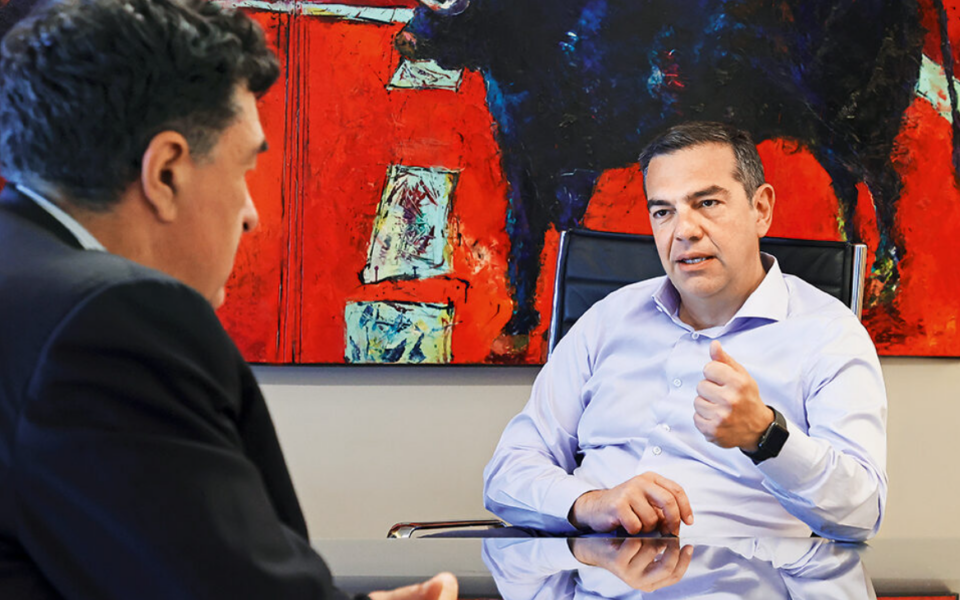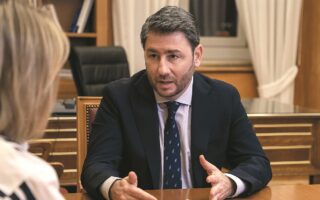Proportional representation is dead for decades

In the May 21 national election, the left-wing main opposition SYRIZA party lost 11.5 points compared to the previous election, in July 2019, and got 20.07% of the vote, far behind ruling New Democracy’s 40.79%.
SYRIZA President and former prime minister Alexis Tsipras provides his own interpretation of the election result in an interview with Kathimerini. He reviews his four years as leader of the opposition, speaks about mistakes he made and explains how he envisions the “day after” for his party.
I would first like to ask you if you have arrived at an explanation for this result.
Even though we did not have enough time for an in-depth analysis, I think we reached some conclusion. Strategically, we got trapped in defending the principle of simple proportional representation and we think this is one of the main reasons for the result. A second reason is that we failed to communicate our message to the voters, that is, to focus on what happened (under the New Democracy government) in 2019-2023 and our proposals for the day after. Debate was dominated by fears of a repetition of what happened in 2015. And last, but not least, is the appearance that SYRIZA-Progressive Alliance presented to the voters: I mean the appearance of a party that had certainly progressed, but which failed to look cohesive. There were contradictory statements that often sowed confusion and provided our main opponent the opportunity to take advantage of its domination of the media and present what was at stake, not the need for political change, but to avoid returning to the difficult days of the (financial) crisis. And this was unfair to us, because the crisis was overcome thanks to our own effort. We left behind the dark days of an austerity (imposed by Greece’s creditors) because, thanks to our efforts in government, trust in the Greek economy was restored.
Let’s move on to proportional representation. Was this an ideological obsession of the left, a trap for the government that followed? Have you regretted it?
It was neither a trap nor an ideological obsession. It was a decades-long vision that used to engage the entire progressive camp. Maybe a romantic vision that aimed to change the political culture, reduce toxicity and instill a spirit of cooperation on the basis of political programs. So we could become like Europe. Many European countries have proportional representation systems. I think our belief that arrogant single-party governments led us to many troubles and, finally, to bankruptcy was to the point. In any case, we failed to make our proposal accepted. And I take the blame for this. The insistent refusal of the other progressive forces to join a debate for a coalition government validated the strategy of our main opponent, New Democracy, and Mr (Kyriakos) Mitsotakis, who posed a clear dilemma: single-party government or an adventure, stability versus instability. So, this may have been a mistake, but I do not regret the strategic choice of proportional representation. Others must be having regrets. I think, sooner or later, the Greek people will realize that the important thing is not to care for our own party but for the country’s future. The (Greek Communist Party) is consistently hostile to anything that would pin it down on how the country must be governed. Even though it claims to be the party of the working class, it is indifferent to the working class’ future. Maybe they are awaiting the Second Coming.
On the other hand, Mr (Nikos) Androulakis’ KINAL-PASOK [note: actually PASOK-KINAL, that is, Panhellenic Socialist Movement – Movement for Change] seems to have as its own goal to restore its domination of the center-left. But, KINAL-PASOK’s internal anguish does not touch the citizens, or their lives. What citizens are concerned about is their future, the country’s future.
If you return to government, will you bring up proportional representation?
Proportional representation has suffered a strategic defeat. So this is not part of my thoughts or intentions. We must respect the Greek people’s decision and must realize that, when an opportunity is lost, it takes many years, maybe decades for this debate to become meaningful again.
I want to get it right: Did you realistically believe that this would work? You had a difficult relationship with PASOK and Mr Androulakis, personally. Every now and then, you called him “open to blackmail” and with the other two parties that…
He considered himself “open to blackmail,” not me.
But you had also called him that at some point, if I remember correctly.
Wait a second, this expression is too strong. We should not let this stand like that. I did not say he was open to blackmail; I said there was an attempt to blackmail him and that he said this particular phrase.
Let me rephrase my previous question: Did you think you could govern with the other two parties, led by Mr (Yanis) Varoufakis and Ms (Zoe) Konstantopoulou, who used to belong to your party? Did you think that was a realistic prospect?
What I considered realistic was the prospect of a progressive government through a convergence between SYRIZA and PASOK. And I considered it realistic because, during the election campaign, KINAL did not have anything negative to say about SYRIZA’s program. We challenged them several times to submit their proposals. To point out where they disagreed with our 11 proposals on the prospect of a progressive government. Maybe they had some extra proposals to make, but, essentially, they did not object. Look, Mr Papachelas, some say that politics is the art of the possible. To me, politics is a synthesis between a vision for a better society and what is achievable. This was the essence behind the “progressive government” strategy. Now, with the new electoral system, the choice is between New Democracy and SYRIZA-Progressive Alliance: Do we want a conservative government program or a progressive one, aiming at a just society and prosperity for all?
‘This may have been a mistake, but I do not regret the strategic choice of proportional representation. Others must be having regrets’
There is a criticism leveled at SYRIZA that it was too lazy to present a coherent program. Also, its image was muddled. You had, on the one hand (populist former minister Pavlos) Polakis and, on the other, (moderate technocrat George) Chouliarakis. Also, that you possibly believed that the government would fall either because of the phone-tapping scandal or the Tempe (rail disaster). Is this true?
OK, a lot can be said in hindsight. I do not think SYRIZA got lazy. But it lost time and the pandemic played a crucial role in this. Timing in politics is extremely important. There is no question that we should have made changes in the party sooner; we made them, but way too late, three years too late. But we couldn’t hold a congress. We could not take initiatives. Despite that, it is unjust to throw away the baby with the bathwater, as the saying goes. Because we made serious changes. The party grew to 150,000 members, where it used to have 15,000. New people emerged. We established a think tank with highly qualified people. We changed the view that excellence was the province of the other party and that we are strangers to a technocratic approach. Of course, contradictions in our public discourse and our public image remained, but I thing all big parties have such contradictions as part of their “big tent” nature. But these contradictions were often blown out of proportion by a media ecosystem that, to put it mildly, was on “the other side.” And I say this not as an excuse, but as a cold-blooded appraisal.
Media and opinion polling. Are they, respectively, biased and staged, as you say? Do you insist on that?
In my view, there is a big issue with information pluralism in this country. Right now, it is a fact that Mr Mitsotakis and New Democracy benefit from an overwhelming backing in the media, especially in television. But, beyond that, the left ought to be competitive under any circumstances. It is not the first time we have faced this. This was also the reality in 2012 and 2015, undoubtedly not to the same degree. About opinion polls: I never said that they are staged. I referred specifically to the fact that we have too many opinion research firms in Greece compared to the rest of Europe. I was talking about the structural challenges these surveys face in a fluid political environment, in a country without strong political identities. You saw the exit polls, they established that 20% of our fellow citizens decided whom to vote for literally just before they reached the ballot box. It is an incredible number – 1.2 million people decided how they would vote at the last moment. So the political environment is fluid. So, the position I expressed in Kathimerini before the election that the opinion surveys would not determine the result was not wrong. It just happened that the polls erred on the opposite side of what we expected.
Maybe at some point you confused social media reality, where SYRIZA seemed to dominate, with actual reality? There has been a lot of debate on that.
What we were sensing in the runup to the election through my campaign travels, my interventions, people’s mobilization, our own people rallying together, our huge rallies, but also social media response, was in the end a whole different sense than what the ballot boxes turned out. So, yes, it is a fact that we did not have a complete picture of social shifts and the way the whole electoral body thinks and behaves. Many times social media are deceiving. You are also deceived by your own people rallying around you, which is not representative of society as a whole.
Are you also carried away by the toxicity and acrimony?
OK, I don’t think these were the main features of this particular campaign.
I mean, earlier as well. During the past few years, in any case.
I will not agree with you. If one can “accuse” SYRIZA-Progressive Alliance of something, it is of not being as tough an opposition as some would like. SYRIZA-Progressive Alliance has contributed much more than many others to stability and democracy in this country and must get the credit for it, Mr Papachelas. Thanks to SYRIZA-Progressive Alliance and its choices, this country not only weathered the storm, but did so with a total commitment to the values of democratic Europe, with a total respect for our Constitution – in contrast to others. In conditions of extreme economic and social crisis, SYRIZA-Progressive Alliance achieved much more than even its friends could imagine: make the big choices that saved the country while salvaging the citizens’ dignity. I am proud to have led this effort.
There is SYRIZA and there is this ecosystem around it, like the trolls.
Yes, but I think that SYRIZA itself was a responsible opposition force these past four years. And during the (2021) wildfires we did not come out shouting and exaggerating. And with the Tempe (rail disaster) we were very responsible. I really wander what would New Democracy do if it were in our position. But that’s another discussion.
No, but there had been other issues in the past on which…
Let’s agree, Mr Papachelas, on unfiltered reality. And the unfiltered reality is that toxicity was not part of SYRIZA-Progressive Alliance’s opposition policy in 2019-2023. This was in contrast to what its opponents did at the time of the (2018) Prespes agreement.
Let me ask you about the (regional unit of) Rodopi. There has been criticism on the part of (New Democracy) that maybe you were aware about some privileged relationship between the (elected SYRIZA) candidate with the Turkish Consulate etc. How do you respond to this?
First of all I think what is dangerous to the nation. And I would call that choice unscrupulous. For 10,000 votes in Rodopi [Note: the only constituency won by SYRIZA on May 21], it creates division in local society too reminiscent of older times, when the Muslim community was under siege. We all know that the Turkish Consulate has been maneuvering in Thrace over the past 45 years. No party has accused another of electing a Muslim MP. It is known that Thrace elects not just SYRIZA-Progressive Alliance MPs, but also from other parties. Same with regional governors and mayors; it is also known, and there were photos published in previous days of lunches of the regional governor, from New Democracy, and that party’s Muslim MP candidate with the Turkish consul and the so-called muftis. An inter-party committee on Thrace was created in 2020, which reached some very important conclusions on how to counter Turkish influence in the area. And, instead of following those steps, we are going to start a conflict, and on these terms? It is clear for us: We are not playing the national card. I hope our political opponents believe that, as well.
Is it true, though, that you ignored some evidence that may have been presented to you of privileged contacts between your own candidate and the Turkish consulate?
Really, I am opposed to that spook-like way of thinking and, I repeat, it is dangerous, because a debate about who has and who doesn’t have contacts will be never-ending. I think what is being attempted is unthinkable and without merit. The only reason is (New Democracy’s) arrogance and conceit, not to see another color (but blue) on the electoral map of Greece the day after an election. And this, in my view, shows a lot. It show the way Mr. Mitsotakis and New Democracy are thinking. He is not content with winning the election. He wants absolute domination.
It is clear that you will not be the first party in these elections. What is the goal now?
SYRIZA is a party of government. It is not a protest party nor a party complementary to the right, whenever it needs or wants it. Our goal, therefore, is to present as clearly as possible the alternative to the governance program of New Democracy so that the Greek people can decide how they want to be governed. We will fight until the last vote and until the last second before the polls close. And at this point it is important to make people aware that the electoral system now is not proportional representation but reinforced [proportional representation], it rewards the first party with a significant bonus of seats. Therefore, any progressive citizen who does not want to see the ND program implemented must know that SYRIZA is essentially the only force that can oppose it, and look ND in the eye. Otherwise, objectively speaking, any progressive vote for parties other than SYRIZA works for the benefit of ND. I think progressive citizens will realize the importance of this dilemma.
You had said in an interview before the previous election (in May) that if the difference between SYRIZA and ND was more than 6 points, there should theoretically be some sanctions for the leadership of the party. We ended up with 20. What will be the day after the June elections?
We currently have one priority: to get to the elections in the best possible terms and the debate for the future will take place in an organized manner. I think, however, that the election result of May 21 does not give me the right to abandon my position. Neither does the electoral battle we have before us.
Can SYRIZA exist without Alexis Tsipras?
Of course it can, but that will be decided by SYRIZA and in conditions that will allow it to see the next day with optimism. To leave behind an introverted faction by saying “you should fend for yourself” would be too selfish, I can’t do it. I feel an obligation not to.
From what I understand, however, what you are saying is that even if there is no significant difference in the result, you will remain president of SYRIZA.
What I am saying is that I will not desert my position. I will stay to keep the party alive, to guarantee its renewal, its reconstruction. Of course, this does not mean that I will be in this post for life. This means, however, that in its difficult hours I will not leave it, I will not abandon it.
Concerning the economy, what are the two things that you consider important and would change as a government? And is there a fear with the increase in taxes, mainly on dividends, that some investors will be discouraged?
Let’s start with an admission: There is no doubt that the country is not in the difficult position it was 15 years ago. However, it continues to lose ground in the EU. In 2007, the per capita income was at 77% of the European average, while today it is at 59%. The big question for the next 10 years is how this can change. In order to be able to recover the lost ground, you must restore work normality, the collective [labor] agreements. As a country, you must have a productive reconstruction plan. Giving tax breaks to the very powerful and the very rich and having 60% of your revenue come from indirect taxes leads to widening inequalities and the impossibility of substantial recovery. In addition, if significant institutional changes are not made in the way the state operates, if there is no acceleration of the pace of justice, we will not have productive investments. We will possibly have investments in tourism and real estate. As [former PASOK premier] Kostas Simitis rightly described it, it will be investment opportunism. Now, as far as taxation is concerned, we should not kid ourselves. It is characteristic of third world countries to have such a large percentage of their public revenue come from indirect taxation. If we add to this the fact that in Greece there is a huge amount of tax evasion and tax avoidance, then it becomes clear that things must change in this field.
But nobody breaches the taboo of taxing the self-employed.
Let’s look at this issue. As far as dividends are concerned, first of all we have to see what is happening in the rest of Europe. In Ireland, dividends are taxed at 50%. In France at 36%. In Germany 28%, if I’m not mistaken, the European average is 26%. Greece and Slovakia are the countries with the lowest tax rate on dividends. The taxation of dividends does not create the necessary fiscal space. But there is a very big debate here about how you can have a fair tax system. The fact that waged labor is taxed at a rate of 22%, 36%, 44%, while dividend income is taxed at 5%, is obviously unfair. This debate must be opened. But I think, because of New Democracy, it is also being conducted in a way that is a bit reminiscent of [former US president Donald] Trump’s election campaign: We tell a nice lie and we don’t care what the truth is. An easy-to-digest lie, like the ones posted by Mr [ND lawmaker Haris] Theocharis and Mr [ND spokesman Akis] Skertsos, who try to convince us that VAT is not being reduced because that would favor the wealthy. In a few days, students will be tested in economics in the university entrance exams and I hope that no one will get carried away by Mr Skertsos and write something like this, because he will get one big zero.
In 2019, Mitsotakis had promised to reduce the tax rates of indirect taxation. He had promised a VAT between 11-22%. So, today, why does he choose to keep indirect taxation high, while all EU countries, following the Commission’s advice, reduced VAT with the exception of Malta, Slovakia and Greece? He does this because he obviously wants, first, to feel a sense of security that he will be able to meet the fiscal goals; a security, however, which is ensured through the plundering of the incomes of the majority. Secondly, he does it because he wants to hand out subsidies. These subsidies that simultaneously favor some powerful – we call them cartels – in energy, refining and the supply chain. All these passes [benefits that ND handed out] for electricity, the supermarket and petrol are allowances which do not stay in people’s pockets, they go to companies to keep prices high. And we see this phenomenon, with prices declining all over Europe, but in Greece they are not easing at the same rate. So the European Commission itself today says, by the end of 2023 we must finish with handouts. Because it’s a vicious cycle, high energy prices fuel inflation. And the question is: What will he do, what is Mitsotakis’ plan? Will he just end the allowances while also keeping indirect taxation high? This will have tragic consequences.
A second crucial question is, what will happen to primary residence auctions? Because if with the first issue that I described to you previously, there was a redistribution of income at the expense of the many in favor of powerful businesses, with this one we will have a very large redistribution of wealth. Today, 700,000 mortgage loans have been passed over from the banks to the funds. We all know that the only solution to prevent the government guarantees of 19 billion euros from expiring is for the auctions to proceed quickly. This will lead to social breakdown.
And the third very big issue is social infrastructure, and especially in public health. In December 2019, we had a total of 108,000 employees, not only health personnel – doctors and nurses – but also administrative staff in the national healthcare system. Today we have 84,000, despite the fact that about 20,000 young people entered the system. What does this mean? This means, if this was, say, a large business and you lost 35% of your staff, that business would be crippled.





